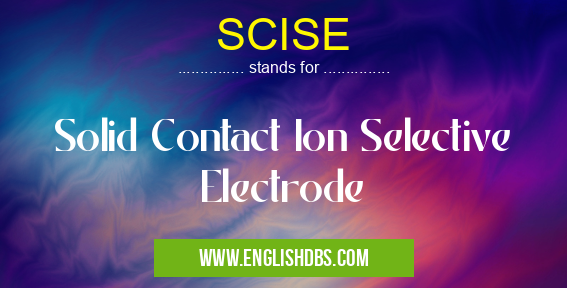What does SCISE mean in CONTACT
SCISE (Solid Contact Ion Selective Electrode) is an electrochemical sensor used for the selective measurement of specific ions in a solution. It is a type of ion-selective electrode (ISE) that utilizes a solid contact between the ion-selective membrane and the internal reference electrode. SCISE is widely employed in various fields, including environmental monitoring, clinical diagnostics, and industrial process control.

SCISE meaning in Contact in Contact
SCISE mostly used in an acronym Contact in Category Contact that means Solid Contact Ion Selective Electrode
Shorthand: SCISE,
Full Form: Solid Contact Ion Selective Electrode
For more information of "Solid Contact Ion Selective Electrode", see the section below.
Ion Selective Electrodes
Ion-selective electrodes (ISEs) are electrochemical sensors designed to measure the activity of specific ions in a solution. They consist of an ion-selective membrane that is selectively permeable to the target ion. The membrane separates the solution being tested from the internal reference electrode. When the ISE is immersed in a solution, an electrochemical potential develops across the membrane due to the difference in ion concentration between the solution and the internal reference electrode.
Types of Ion Selective Electrodes
There are two main types of ISEs:
Liquid Contact Ion Selective Electrodes (LCISE): In LCISE, the ion-selective membrane is in direct contact with the internal reference electrode, which is a liquid electrolyte.
Solid Contact Ion Selective Electrodes (SCISE): In SCISE, the ion-selective membrane is separated from the internal reference electrode by a solid contact material, such as a polymer or a metal salt.
Advantages of SCISE
Improved stability: The solid contact eliminates the potential for contamination or leakage of the internal reference electrode.
Longer lifespan: The solid contact protects the internal reference electrode from chemical reactions and physical damage, extending the electrode's lifespan.
Reduced maintenance: SCISE requires less frequent maintenance and calibration compared to LCISE.
Compact size: The solid contact allows for miniaturization of the electrode, making it suitable for use in portable devices or implantable sensors.
Applications of SCISE
SCISE is used in a wide range of applications, including:
Environmental monitoring: Measuring heavy metal ions, anions, and other pollutants in water, soil, and air.
Clinical diagnostics: Measuring electrolytes (e.g., Na+, K+, Cl-) in blood, urine, and other bodily fluids.
Industrial process control: Monitoring ion concentrations in industrial processes, such as water treatment, chemical synthesis, and food production.
Biosensing: Detecting specific ions involved in biological processes, such as pH, calcium, and glucose.
Essential Questions and Answers on Solid Contact Ion Selective Electrode in "CONTACT»CONTACT"
What is a Solid Contact Ion Selective Electrode (SCISE)?
A SCISE is a type of electrochemical sensor used to measure the concentration of specific ions in a solution. It consists of a solid ion-selective membrane that is in direct contact with the sample solution. The membrane is designed to be selectively permeable to the target ion, allowing it to pass through while blocking other ions. The potential difference between the membrane and a reference electrode is measured, which is proportional to the logarithm of the ion concentration.
How does a SCISE work?
When the SCISE is immersed in a solution containing the target ion, the ion selectively binds to the membrane. This creates a charge separation across the membrane, with the inside becoming negatively charged and the outside becoming positively charged. The reference electrode measures the potential difference between the solution and the membrane, which is proportional to the concentration of the target ion.
What are the advantages of using a SCISE?
SCISEs offer several advantages over other types of ion-selective electrodes, including:
- High selectivity for the target ion
- Rapid response time
- Long lifespan
- Ability to measure ions in a wide range of concentrations
- Relatively simple and inexpensive
What are the limitations of using a SCISE?
SCISEs also have some limitations, such as:
- They can be affected by changes in pH and temperature
- They may exhibit cross-sensitivity to other ions
- They require regular calibration to maintain accuracy
What are the applications of SCISEs?
SCISEs are used in a variety of applications, including:
- Environmental monitoring
- Industrial process control
- Medical diagnostics
- Food analysis
- Drug monitoring
Final Words: SCISE is an advanced type of ion-selective electrode that offers advantages in stability, lifespan, maintenance, and compactness. It is widely used in various fields, including environmental monitoring, clinical diagnostics, industrial process control, and biosensing. The solid contact between the ion-selective membrane and the reference electrode makes SCISE a reliable and versatile tool for selective ion measurement.
